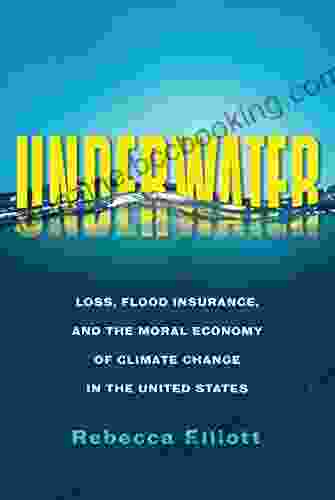Loss Flood Insurance and the Moral Economy of Climate Change in the United States

As the consequences of climate change become increasingly evident, the United States finds itself grappling with the profound impact of extreme weather events on its citizens and communities. Among these events, flooding poses a particularly devastating threat, wreaking havoc on property, infrastructure, and livelihoods.
4 out of 5
| Language | : | English |
| File size | : | 9101 KB |
| Text-to-Speech | : | Enabled |
| Screen Reader | : | Supported |
| Enhanced typesetting | : | Enabled |
| X-Ray | : | Enabled |
| Word Wise | : | Enabled |
| Print length | : | 293 pages |
In response to this growing threat, the National Flood Insurance Program (NFIP) was established in 1968 to provide financial assistance to homeowners and businesses in flood-prone areas. However, as climate change intensifies, the NFIP has come under increasing strain, facing significant financial challenges and raising complex moral questions about the distribution of disaster relief and the responsibility of society in mitigating the impacts of climate change.
The Financial Burden of Loss Flood Insurance

The NFIP is a federally subsidized program, and its financial stability has been severely compromised by the rising frequency and severity of flood events. In 2017, Hurricane Harvey alone caused an estimated $125 billion in damage, and the NFIP was forced to borrow billions of dollars from the U.S. Treasury to cover claims.
The financial burden of loss flood insurance is not only borne by the government but also by individual homeowners and businesses. Flood insurance premiums have skyrocketed in recent years, making it increasingly difficult for people in flood-prone areas to afford coverage. This has led to a situation where many homeowners are underinsured or uninsured, leaving them vulnerable to financial ruin in the event of a flood.
The Moral Economy of Climate Change
The financial challenges posed by loss flood insurance raise complex moral questions about the distribution of disaster relief and the responsibility of society in mitigating the impacts of climate change.
On the one hand, there is a strong case to be made for providing financial assistance to victims of natural disasters. Extreme weather events can have a devastating impact on people's lives, and it is only right that society should step in to help those who have been affected.
On the other hand, there is also a need to consider the moral hazard created by disaster relief. When people know that they will be financially compensated for losses incurred in a flood, they may be less inclined to take steps to mitigate the risks. This can lead to a vicious cycle where increasing disaster relief costs lead to higher flood insurance premiums, which in turn leads to more people being underinsured or uninsured.
The Way Forward
Addressing the moral economy of loss flood insurance and climate change requires a comprehensive approach that considers both the financial and ethical dimensions of the issue.
One important step is to invest in flood mitigation measures. By building seawalls, levees, and other flood control structures, we can reduce the risk of flooding and the associated financial burden. This will not only save lives and property but also help to reduce the cost of flood insurance premiums.
Another important step is to reform the NFIP to make it more financially sustainable. This could involve increasing premiums for homeowners in high-risk areas, providing subsidies for low-income households, and exploring alternative funding mechanisms.
Finally, it is essential to address the underlying causes of climate change by reducing greenhouse gas emissions. By transitioning to a clean energy economy, we can help to mitigate the impacts of climate change and reduce the risk of future flooding events.
Loss flood insurance and climate change present a complex and challenging moral economy for the United States. By understanding the financial burdens and moral implications of disaster relief, we can work together to develop a comprehensive approach that ensures that those who are affected by flooding receive the assistance they need while also mitigating the risks and reducing the financial burden for all.
4 out of 5
| Language | : | English |
| File size | : | 9101 KB |
| Text-to-Speech | : | Enabled |
| Screen Reader | : | Supported |
| Enhanced typesetting | : | Enabled |
| X-Ray | : | Enabled |
| Word Wise | : | Enabled |
| Print length | : | 293 pages |
Do you want to contribute by writing guest posts on this blog?
Please contact us and send us a resume of previous articles that you have written.
 Book
Book Novel
Novel Page
Page Chapter
Chapter Text
Text Story
Story Genre
Genre Reader
Reader Library
Library Paperback
Paperback E-book
E-book Magazine
Magazine Newspaper
Newspaper Paragraph
Paragraph Sentence
Sentence Bookmark
Bookmark Shelf
Shelf Glossary
Glossary Bibliography
Bibliography Foreword
Foreword Preface
Preface Synopsis
Synopsis Annotation
Annotation Footnote
Footnote Manuscript
Manuscript Scroll
Scroll Codex
Codex Tome
Tome Bestseller
Bestseller Classics
Classics Library card
Library card Narrative
Narrative Biography
Biography Autobiography
Autobiography Memoir
Memoir Reference
Reference Encyclopedia
Encyclopedia Louis A Decaro Jr
Louis A Decaro Jr Kevan Houser
Kevan Houser Katherine Roberts
Katherine Roberts Tammie Lyon
Tammie Lyon Yun Rou
Yun Rou Kathy H Kitts
Kathy H Kitts Ken Burns
Ken Burns Nicholas Meyer
Nicholas Meyer Robert M Sapolsky
Robert M Sapolsky Kelly Oram
Kelly Oram Kevin Mcaleer
Kevin Mcaleer Kemi Iwalesin
Kemi Iwalesin Kimberly Dean
Kimberly Dean Margaret Coker
Margaret Coker Violet Kupersmith
Violet Kupersmith Ken Siri
Ken Siri Spike Bucklow
Spike Bucklow Kris Rivenburgh
Kris Rivenburgh Warwick Trucker
Warwick Trucker Susan Rosser
Susan Rosser
Light bulbAdvertise smarter! Our strategic ad space ensures maximum exposure. Reserve your spot today!
 Ivan TurnerFollow ·12.8k
Ivan TurnerFollow ·12.8k Calvin FisherFollow ·2.9k
Calvin FisherFollow ·2.9k Chad PriceFollow ·7.8k
Chad PriceFollow ·7.8k Garrett PowellFollow ·17.1k
Garrett PowellFollow ·17.1k Adam HayesFollow ·15.1k
Adam HayesFollow ·15.1k Cameron ReedFollow ·3k
Cameron ReedFollow ·3k Ryūnosuke AkutagawaFollow ·5.3k
Ryūnosuke AkutagawaFollow ·5.3k Guy PowellFollow ·6.3k
Guy PowellFollow ·6.3k

 Joshua Reed
Joshua ReedUnveiling the Profound Essence of Taekwondo: Spirit and...
Taekwondo, an ancient...

 Clarence Brooks
Clarence BrooksUnveiling Clarity: The Common Sense Guide to Everyday...
In the labyrinthine world of legal...

 Anthony Wells
Anthony WellsBless Me, Ultima: A Literary Odyssey into the Heart of...
In the tapestry of American literature,...

 Alexandre Dumas
Alexandre DumasPioneer Life Or Thirty Years A Hunter - A Captivating...
Discover the Raw and...

 Samuel Beckett
Samuel BeckettThe Mike Fisher Story: An Inspiring Tale of Faith,...
Prepare to be...
4 out of 5
| Language | : | English |
| File size | : | 9101 KB |
| Text-to-Speech | : | Enabled |
| Screen Reader | : | Supported |
| Enhanced typesetting | : | Enabled |
| X-Ray | : | Enabled |
| Word Wise | : | Enabled |
| Print length | : | 293 pages |














